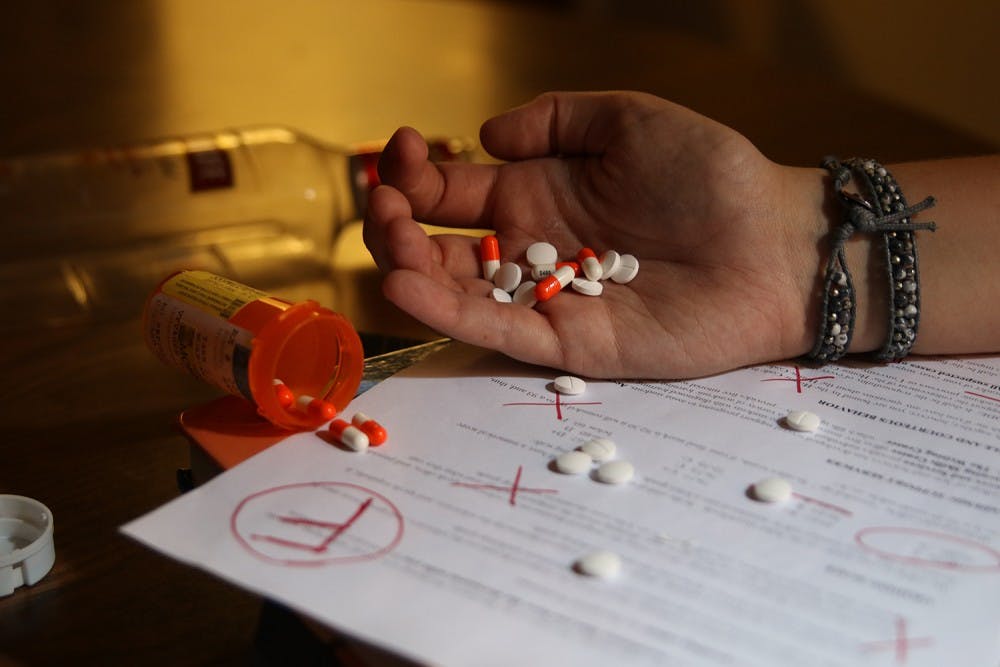Soon, she realized spending time in the library interfered with going out. As soon as a teacher assigned work during syllabus week, Crenshaw would switch to a new class.
Constantly changing and skipping classes caught up to Crenshaw, and by February, she had D’s and F’s in multiple classes.
“In a three week, or maybe a month span, my grades were beyond repair,” she said. “Had I stayed that semester, it would have tanked my GPA.”
Crenshaw’s struggle to handle the pressures of college courses while living with addiction is not an unusual one. Frank Allison, a program coordinator for UNC Student Wellness, said the outside time and energy courses require can make dealing with substance abuse during college more difficult than a routine, 9-to-5 job.
“You have a schedule, but your schedule varies from day to day,” he said. “You have things you have to do outside of the class to be effective in the class.”
UNC psychology professor Todd Thiele said heavily using substances can also negatively alter short- and long-term memory, as well as cause sleep deprivation, threatening classroom performance.
An issue of learning
Some believe addiction is not a disease or moral failing, but a learning disorder. Maia Szalavitz, in a column published in The New York Times in June, noted the differences in the brain that affect one’s decisions when struggling with substance dependence.
While the American Society of Addiction Medicine defines addiction as a chronic disease, Szalavitz’s column — along with other ones like it — has caused debate over how addiction should be classified.
Thiele said that although he believes drug and alcohol addiction is a brain disease, he sees the learning disorder argument as valid, due to the habit-forming components of addiction.
“As we regularly go to our friend’s house or favorite bar and drink alcohol, as we grow to maybe misuse alcohol in those familiar environments, the environments and those stimuli associated with the consuming experience come to trigger the memory of drinking and the event,” Thiele said.
Over time, the brain sees it as a habit instead of a reward, Thiele said, and decision-making changes in a way that jeopardizes academic performance.
To get the day's news and headlines in your inbox each morning, sign up for our email newsletters.
The habits that came with Crenshaw’s addiction were the reason she chose not to go back to Maryland, and instead spend two semesters at UNC-Charlotte before transferring to UNC.
An insensitive culture
Allison finds the learning disorder approach misleading and potentially dangerous for those struggling with their substance use. He believes in the biopsychosocial model, which considers social learning a component in developing addictions.
But Allison fears that labeling drug addiction as anything other than a disease may cause people not to take it as seriously as other medical conditions.
“If you have cancer, they consider you to be cancer-free in remission at the five year mark,” Allison said. “Typically, if you go to a treatment facility for substance use disorder, you stay maybe 30 to 45 days and they have a graduation celebration, pat you on the back and tell you to go right back to where you were at and expect you to be in remission.”
Crenshaw said she believes addiction, regardless of what it’s classified as, is not taken seriously enough during college. She often hears classmates joke about being alcoholics and very few understand what it really entails.
“I have a couple friends in med school, and they will tell you that in med school they spend less than a week on addiction,” she said “That just blows my mind.”
Adi Jaffe, a UCLA addiction researcher who struggled with his own drug addiction issues before studying the topic, said classifying addiction as a disease may be simplifying the issue. Instead, he sees it as a syndrome because the symptoms of addiction, unlike those of many chronic illnesses, don’t follow a specific trajectory.
“If you’re diabetic, your body either stops producing insulin or became insensitive to insulin — it’s a very specific biological understanding of what happened,” he said. “We don’t have that clear of a path with addiction.”
Despite being sober for three years, Crenshaw still struggles to get away from college drinking culture.
In the classroom, Saturday nights playing flip cup aren’t just popular conversation topics for students. Teachers in several of Crenshaw’s classes will make jokes about drinking and partying. Business and economics classes will also use breweries or other alcoholic industries as examples for assignments in an attempt to relate to their students.
The jokes and examples made Crenshaw angry until her fiance, who is six years clean, helped her realize the jokes weren’t personal attacks.
Teachers know students party, she said, and, in some cases, acknowledgement can come off as encouragement.
“We’re in a time in our lives where it is incredibly encouraged to get wasted, get plastered,” Crenshaw said. “This is the only time in our lives where we’re encouraged to get shitfaced all the time.”
@yayjennic
enterprise@dailytarheel.com



